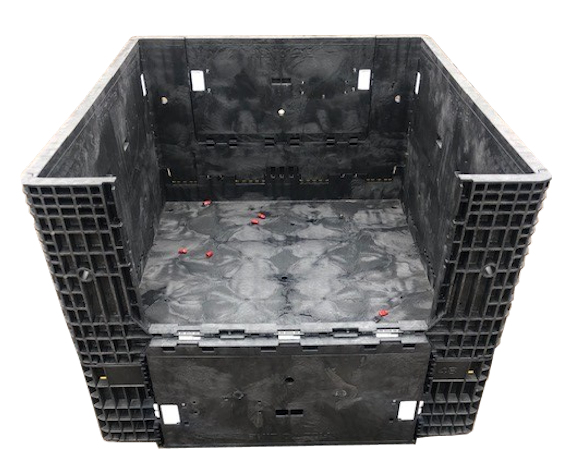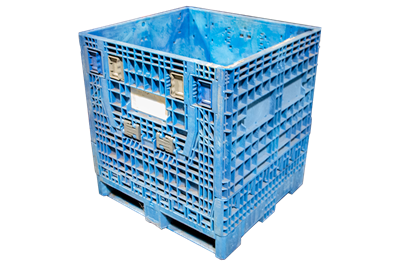The Ultimate Guide to Selecting the Right Bulk Containers for Your Organization Requirements
Selecting the suitable mass containers is critical for any organization that relies upon reliable logistics. Numerous kinds of containers exist, each designed for details products and applications. Factors such as size, product compatibility, and regulative criteria play a significant role in this decision-making procedure. Comprehending these aspects can lead to improved functional effectiveness. Nonetheless, lots of organizations ignore crucial aspects that can enhance their total performance and sustainability. What are these factors to consider?
Understanding Various Sorts Of Bulk Containers
Mass containers act as crucial tools for organizations seeking effective storage space and transport options. These containers are available in different kinds, each made to satisfy certain operational demands. One common type is the intermediate bulk container (IBC), which is perfect for fluid and granulated materials, offering an equilibrium of ability and ability to move. Another preferred alternative is the bulk bag, or FIBC, suitable for dry, flowable items. These adaptable containers are light-weight and can be quickly carried and saved. For much heavier products, rigid mass containers are frequently utilized, giving longevity and security for risk-free handling. Additionally, there are specialized containers customized for hazardous products, guaranteeing conformity with safety guidelines. Comprehending the unique attributes of these mass container types allows businesses to make informed decisions that optimize logistics and lower prices. By picking the ideal container, firms can enhance their operational efficiency and simplify their supply chain processes.
Secret Material Factors To Consider for Bulk Containers
When selecting mass containers, it is necessary to ponder the products made use of in their building and construction. Factors such as chemical, toughness, and strength compatibility play a vital function in making sure the containers meet specific operational requirements. Furthermore, weight and portability issues can affect both effectiveness and transport logistics.
Material Toughness and Toughness
Longevity and strength are crucial aspects in picking materials for mass containers, as they straight influence the container's ability to endure various environmental conditions and dealing with procedures. Products such as high-density polyethylene (HDPE), polypropylene, and stainless steel are generally favored for their robust residential or commercial properties, using resistance to temperature level, influence, and abrasion changes. The choice of material also affects the overall lifespan of the container; stronger materials usually cause much less regular substitutes, leading to set you back savings with time. In addition, the weight of the material can impact shipping expenses and simplicity of handling. Organizations should consider their details operational settings and the potential for deterioration to guarantee peak sturdiness and stamina in their bulk container selection.
Chemical Compatibility Factors
Recognizing chemical compatibility is important for choosing bulk containers, as the products utilized must stand up to the specific substances they will certainly hold. Different variables influence compatibility, consisting of the chemical nature of the contents, temperature level, and period of storage space. Destructive chemicals may call for containers made from stainless steel or specialized plastics that withstand degradation. Furthermore, responsive substances can generate warmth or gases, requiring aired vent or pressure-rated containers. The option of container product, whether metal, polyethylene, or polycarbonate, ought to straighten with the chemical properties of the kept substances to protect against leakages or violations. Inevitably, a detailed examination of these compatibility elements guarantees safe handling and storage, protecting both workers and the atmosphere while keeping item stability.
Weight and Mobility Problems
Selecting mass containers includes not just evaluating chemical compatibility yet likewise taking into consideration weight and portability. Services have to assess the simplicity of handling and transportation to maximize efficiency. Light-weight materials like high-density polyethylene (HDPE) or light weight aluminum can promote simpler movement and decrease delivery costs. Alternatively, heavier containers might provide boosted sturdiness yet can impede mobility, specifically in atmospheres needing frequent relocation. Additionally, the layout of the container ought to enable convenient training and stacking, ensuring ergonomic safety and security for employees. Business ought to likewise think about the infrastructure readily available for transport; for instance, containers compatible with forklifts or pallet jacks can improve procedures. Eventually, the right equilibrium between weight and transportability directly influences operational effectiveness and expense performance.
Sizing Your Mass Containers for Optimal Efficiency
When sizing bulk containers, organizations have to thoroughly analyze the measurements needed to suit their particular items. Furthermore, weight ability is an essential element that affects effectiveness and safety and security throughout transport and storage space. Efficient sizing not just makes best use of space yet also enhances operational operations.
Determining Container Dimensions
Choosing the right measurements for bulk containers is vital for maximizing effectiveness in storage and transport. Organizations need to analyze their details needs, considering aspects such as offered area, the nature of the products being saved, and the approaches of transportation used. Precise measurements ensure that containers fit ideally in vehicles and storage facilities, decreasing lost room and decreasing handling time. Criterion sizes can offer comfort, however customized dimensions could be necessary for special requirements or to fit specific products. Additionally, it is very important to review stacking capabilities and accessibility, as these elements affect general functional efficiency. Inevitably, the ideal measurements result in improved organization and streamlined logistics, benefiting the general productivity of business.
Weight Ability Considerations
Comprehending weight ability is crucial for organizations aiming to maximize their mass container performance. The weight capability of a container straight affects storage capacities, transportation logistics, and total functional prices. Picking containers with the suitable weight restrictions guarantees that organizations can securely keep and transport their items without risking damage or compliance issues. Overloading containers can lead to structural failures, while underutilizing capability results in lost sources. It is essential for organizations to examine their product weights and take into consideration any regulative needs when picking containers. Additionally, variables such as the sort of material, planned use, and environmental problems need to additionally influence weight capability choices. By evaluating these elements, organizations can improve effectiveness and ensure a structured supply chain.
Regulatory Compliance and Safety Criteria

Regulatory conformity and safety requirements play a necessary function in the option of bulk containers for companies. Organizations has to assure that their containers meet numerous policies set by local, nationwide, and global authorities. These criteria frequently concern material security, structural integrity, and proper labeling, which assist protect against mishaps and guarantee the safe transportation of products.
In addition, adherence to industry-specific blog here standards, such as those from the Food and Medicine Administration (FDA) or the Occupational Security and Health And Wellness Administration (OSHA), is crucial for business taking care of dangerous materials or foodstuff. Non-compliance can result in penalties, legal issues, or damages to a business's credibility.
Organizations must also think about the container's compatibility with the materials being saved or transferred to stay clear of contamination or chemical reactions (used bulk containers). To sum up, comprehending and carrying out regulatory compliance and safety requirements is necessary for the accountable and efficient usage of mass containers
Sustainability Choices for Eco-Friendly Bulk Containers

Firms are likewise discovering choices made from recycled products, which not just preserve sources but also sustain the reusing industry. Moreover, advancements in style enable for lighter containers that call for much less energy to transportation, better boosting sustainability. By incorporating these environmentally friendly mass container options, organizations can show their dedication to environmental stewardship while meeting consumer need for lasting methods. This shift not only helps the earth however can additionally improve brand name credibility and client loyalty.
Cost-Effectiveness and Budgeting for Mass Containers
While lots of organizations concentrate on sustainability, cost-effectiveness stays a vital aspect when selecting bulk containers. Organizations must evaluate the initial purchase cost, in addition to long-lasting functional costs, to ensure monetary viability. Factors such as durability, maintenance, and reusability play a considerable duty in establishing general expenses.
Purchasing high-quality containers may yield higher upfront prices but can lead to financial savings with lowered substitute rates and lowered waste. Furthermore, businesses need to consider transport costs and storage efficiency, as these can affect the overall budget.

Often Asked Concerns
Exactly how Do I Establish the Right Container for Hazardous Products?
To figure out the best container for dangerous products, one should evaluate compatibility with the substance, consider the container's product, see here now check for regulative compliance, and examine ability and security functions to ensure appropriate handling and storage space.
Can Bulk Containers Be Customized for Specific Products?
Yes, bulk containers can be tailored for particular products. used bulk containers. Numerous attributes, such as style, material, and dimension, can be tailored to meet special requirements, ensuring suitable safety and security and performance for transporting and keeping different goods
What Is the Typical Life Expectancy of Different Bulk Container Kind?
The average life-span of mass container types varies; plastic containers last 5-10 years, steel containers 10-20 years, and wooden containers generally last 3-7 years, depending upon usage, upkeep, and environmental problems.
Just how Should I Tidy and Maintain Bulk Containers?
To cleanse and preserve bulk containers, one should consistently check for damages, remove residue, wash with suitable detergents, wash thoroughly, and assurance proper drying out before storage. Complying with supplier standards boosts longevity and safety and security throughout usage.
Exist Rental Choices for Bulk Containers Available?
Yes, many business supply rental options for mass containers, supplying adaptability for companies. These rentals can accommodate different demands, permitting business to take care of inventory successfully without the dedication of buying containers outright.
Resilience and stamina are essential variables in selecting materials for mass containers, as they straight influence the container's capacity to endure different ecological conditions and taking care of processes. Comprehending chemical compatibility is vital for choosing bulk containers, as the materials used must withstand the details substances they will hold. Comprehending weight capability is crucial for businesses aiming to optimize their mass container image source effectiveness. Regulative compliance and safety and security standards play an essential duty in the choice of bulk containers for businesses. While several companies concentrate on sustainability, cost-effectiveness continues to be a critical variable when selecting mass containers.